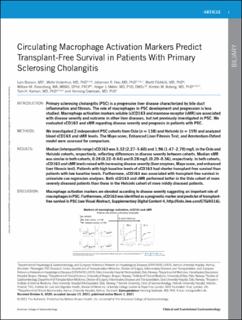| dc.contributor.author | Bossen, Lars | |
| dc.contributor.author | Vesterhus, Mette Nåmdal | |
| dc.contributor.author | Hov, Johannes Espolin Roksund | |
| dc.contributor.author | Färkkilä, Martti | |
| dc.contributor.author | Rosenberg, William | |
| dc.contributor.author | Møller, Holger J. | |
| dc.contributor.author | Boberg, Kirsten Muri | |
| dc.contributor.author | Karlsen, Tom Hemming | |
| dc.contributor.author | Grønbæk, Henning | |
| dc.date.accessioned | 2021-08-18T13:54:36Z | |
| dc.date.available | 2021-08-18T13:54:36Z | |
| dc.date.created | 2021-06-21T12:26:57Z | |
| dc.date.issued | 2021 | |
| dc.identifier.issn | 2155-384X | |
| dc.identifier.uri | https://hdl.handle.net/11250/2770153 | |
| dc.description.abstract | INTRODUCTION:
Primary sclerosing cholangitis (PSC) is a progressive liver disease characterized by bile duct inflammation and fibrosis. The role of macrophages in PSC development and progression is less studied. Macrophage activation markers soluble (s)CD163 and mannose receptor (sMR) are associated with disease severity and outcome in other liver diseases, but not previously investigated in PSC. We evaluated sCD163 and sMR regarding disease severity and prognosis in patients with PSC.
METHODS:
We investigated 2 independent PSC cohorts from Oslo (n = 138) and Helsinki (n = 159) and analyzed blood sCD163 and sMR levels. The Mayo score, Enhanced Liver Fibrosis Test, and Amsterdam-Oxford model were assessed for comparison.
RESULTS:
Median (interquartile range) sCD163 was 3.32 (2.27–5.60) and 1.96 (1.47–2.70) mg/L in the Oslo and Helsinki cohorts, respectively, reflecting differences in disease severity between cohorts. Median sMR was similar in both cohorts, 0.28 (0.22–0.44) and 0.28 mg/L (0.20–0.36), respectively. In both cohorts, sCD163 and sMR levels raised with increasing disease severity (liver enzymes, Mayo score, and enhanced liver fibrosis test). Patients with high baseline levels of sCD163 had shorter transplant-free survival than patients with low baseline levels. Furthermore, sCD163 was associated with transplant-free survival in univariate cox-regression analyses. Both sCD163 and sMR performed better in the Oslo cohort of more severely diseased patients than those in the Helsinki cohort of more mildly diseased patients.
DISCUSSION:
Macrophage activation markers are elevated according to disease severity suggesting an important role of macrophages in PSC. Furthermore, sCD163 was identified as a prognostic marker and predictor of transplant-free survival in PSC (see Visual Abstract, Supplementary Digital Content 4, http://links.lww.com/CTG/A516). | en_US |
| dc.language.iso | eng | en_US |
| dc.publisher | Wolters Kluwer | en_US |
| dc.rights | Attribution-NonCommercial-NoDerivatives 4.0 Internasjonal | * |
| dc.rights.uri | http://creativecommons.org/licenses/by-nc-nd/4.0/deed.no | * |
| dc.title | Circulating Macrophage Activation Markers Predict Transplant-Free Survival in Patients With Primary Sclerosing Cholangitis | en_US |
| dc.type | Journal article | en_US |
| dc.type | Peer reviewed | en_US |
| dc.description.version | publishedVersion | en_US |
| dc.rights.holder | Copyright 2021 The Authors | en_US |
| dc.source.articlenumber | e00315 | en_US |
| cristin.ispublished | true | |
| cristin.fulltext | original | |
| cristin.qualitycode | 2 | |
| dc.identifier.doi | 10.14309/ctg.0000000000000315 | |
| dc.identifier.cristin | 1917231 | |
| dc.source.journal | Clinical and Translational Gastroenterology | en_US |
| dc.identifier.citation | Clinical and Translational Gastroenterology. 2021, 12 (3), e00315. | en_US |
| dc.source.volume | 12 | en_US |
| dc.source.issue | 3 | en_US |

